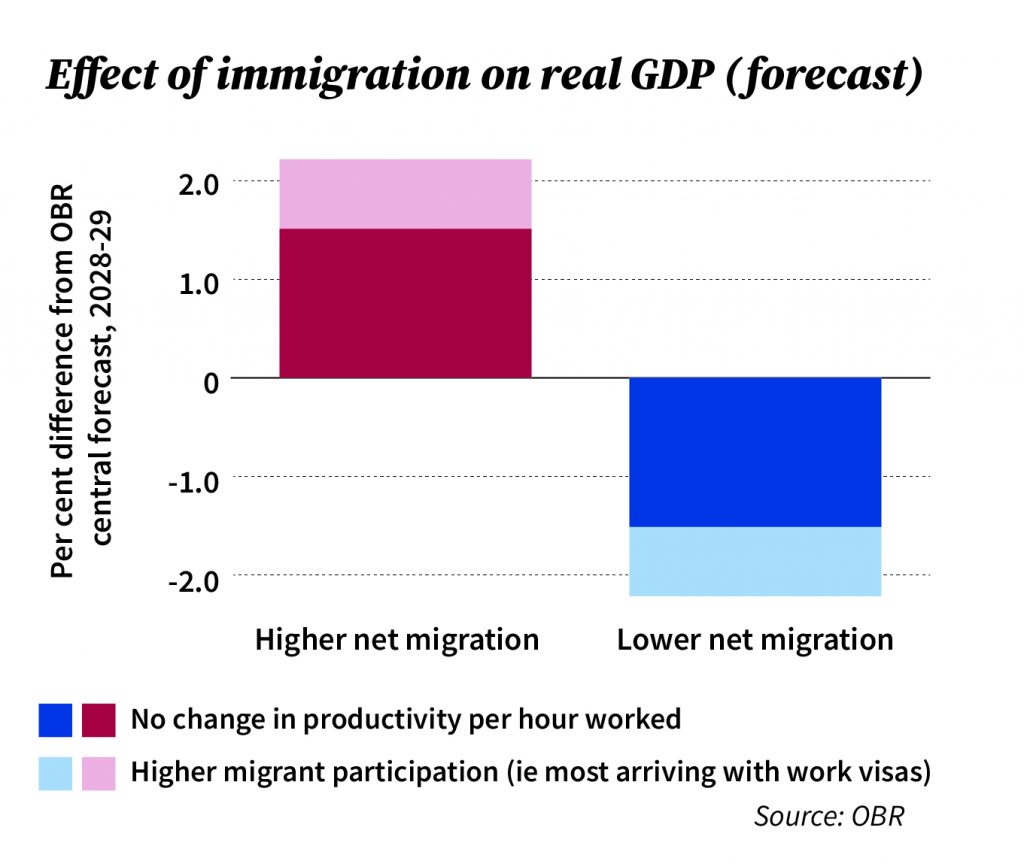Jeremy Hunt’s budget was a rather pathetic affair, and one of the most depressing parts was the chancellor’s repeated claim that he wanted British jobs for British people. Or as Hunt put it at least five times: “Our plan is for economic growth not sustained through migration but one that raises wages and living standards for families.”
First of all, this is a bit of a cheek. Immigration is at record highs under this government, at over 700,000 last year.
Second, and most importantly, that same immigration is helping to fuel some of the (small) British growth that Hunt boasted about elsewhere in his speech.
The Office for Budget Responsibility (OBR), the experts who check the government’s figures, have done research in this area and they conclude that higher immigration is good for the British economy. They published their latest work on this at the same time as the budget.
The OBR points out that an ageing, post-Covid Britain needs more people available for work. Its report says: “The number of inactive working-age adults is no longer declining from its post-pandemic peak, and has instead rebounded to 9.3 million. This keeps it around its highest level in over a decade and 700,000 more than before the pandemic.”
This state of affairs is likely to be a permanent drain on the UK economy. It isn’t rocket science: fewer workers means less economic activity. You could try to tempt more people back into the workforce by drastically lowering the cost of childcare while properly funding the NHS, but those ideas seem fanciful. So the only real answer to a shortage of workers is to find some from somewhere – by encouraging more immigration.
Which means the record levels of immigration that this Tory government has overseen have been good for the economy overall and have brought in more taxes. Yet Hunt not only cannot bring himself to mention such a huge win, but actually claims to want to reduce immigration, thus making his job more difficult.
The facts are laid out very clearly in the OBR’s work. It assumes that net immigration will fall from its record levels to around 315,000 per year, because much of the current increase is fuelled by a pent-up demand by foreign would-be students for university places that could not be satisfied during the pandemic.
But the report adds: “If annual net migration was around 200,000 higher or lower than the ONS [Office for National Statistics] projection of 315,000 in the medium term, it might raise or lower GDP by around 1.5% in 2028-29, respectively.”
To be clearer, this means that cutting immigration to just 115,000 a year would take 1.5% off GDP growth, while if immigration was 200,000 higher it would add 1.5%. It’s a net difference of 3% – almost the same hit that Brexit is causing to the UK economy.

The OBR adds that with higher immigration, government borrowing and debt would both be lower. “In our higher migration scenario, borrowing is £19.9bn lower by the forecast horizon, and underlying debt 3.1% lower as a share of GDP. Our downside scenario is symmetric, with borrowing up by £19.9bn and underlying debt up by 3.1% of GDP.” So, the difference is £40bn in borrowing – a massive amount.
That is not, however, the total benefit, because if you assume that immigrants are more likely to work than UK citizens, then the benefits are even larger. Given the long-term sickness rate in the UK and the fact that most immigrants are young and now arriving on “work visas”, this is not an absurd assumption at all.
If you take that into account, “This boosts the impact on GDP to 2.2% (rather than the 1.5% mentioned earlier) in 2028-29 and raises GDP per person 0.8% above our forecast.” That is a huge win for the British economy – and a win the government is fighting with all its might to avoid.
And if you are one of those people who have been convinced by the persistent propaganda in the right wing press that somehow healthy young immigrants arriving on work visas are a drain on the NHS and the benefit system, then think again. The higher spending necessary because of the increase in immigration is more than offset by the higher taxes they pay, by a ratio of 3:1, leaving the country some £12bn better off every year.
Since the government has tried to limit immigration by making immigrants apply for work visas, take higher-skilled and better-paid jobs and in many cases leave their dependants at home, this is a fairly obvious conclusion. In fact, it seems that the new higher level of non-European immigration is even more of a positive for the economy than immigration from the EU before Brexit.
In short, the government knows that more immigration is good for Britain, but because of its need to pander to the right of its party, its chosen course is to reduce immigration, directly sabotaging the UK economy.
It is not even as though the UK is being disproportionately flooded with foreigners. About 14% of the UK’s population was born abroad; the same percentage as in France and Spain, and just below that in Germany. The fact is that almost all developed countries are struggling with the same problem: their birth rate is too low to replace their working-age population, and so they need foreign workers.
Instead of using the budget to begin a rational debate that acknowledges this, how British industry of every type is crying out for more staff and how the best answer is immigration, Hunt preferred to reach out to those abandoning the Tories for Reform by indulging in the old nonsense – that Labour would allow “unlimited immigration” while the government can achieve growth just with British-born workers.
Spreading horse manure might encourage growth on your allotment, but it’s not going to work on the economy.




